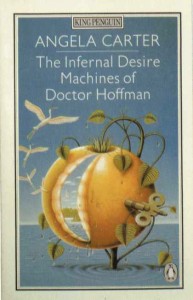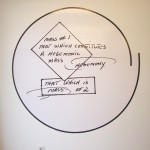The nation-state and the "marxist" ideological apparatuses connected with it (parties, cells, unions, and other…
Machines of desire
 Reading ‘book for the electronic art’, great stuff for interaction lovers like me. It has a number of essays, one of them explains very succinctly what Deleuze and Guattari are all about. I post it here because it made me understand the point of departure of these two gentlemen. It also made me define ‘play’ as the product(ion) of desire.
Reading ‘book for the electronic art’, great stuff for interaction lovers like me. It has a number of essays, one of them explains very succinctly what Deleuze and Guattari are all about. I post it here because it made me understand the point of departure of these two gentlemen. It also made me define ‘play’ as the product(ion) of desire.
Quote ” Gilles Deleuze and Felix Guattari in their ‘Anti-Oedipus (1972) have tried to free this unconscious from the clutches of psychoanalysis by attacking the so-called Oedipus complex: our unconscious is not a stage where time and again the same classical tragedy of Oedipus’s’ love of his mother and hatred of his father is played out. Our unconscious is a much more modern phenomenon, a steadily working machine shop. The machines of desire in there are continuously producing connections between all sorts of things: the organs inside the body and things outside it, animals, plants, uncles and aunts, nice neighbours, friends, mouths, fingers, devices, tools, peculiarities, preferences and aversions.
Machines of desire produce wild energy streams that want to break clean through all constricting social boundaries, including an idée fixe like the Oedipus complex. Desire does not stem from a shortage that needs to be replenished. It is a surplus, a wealth of enthusiasm, of energies that wish to produce, connect and take off.
The image of the unconscious as a collection of busily buzzing machines of desire is such a strong one because it gives a good idea of what it is like to create things. You form the strangest connections between materials, objects, words and thoughts, leading in turn to new links, new hybrids, new clusters. Maybe this is why artists in particular are such admirers of Deleuze and Guattari’s body of thought, and above all of the speculative sequel to their Oedipus book, Thousand Plateau’s (1980). The question, however, is: why would the unconscious, seen as machine(s), be the ideal tool to break through all disciplinary codes of behaviour, all imposed limitations and social strata? Why wouldn’t the metaphor of the unconscious-as-machine be an equally disciplining and coercive code as that of the body-as-machine? In other words, what is so great about production?
Against this coercive production to which the machine-like body and ditto unconscious are subjected, Jean Baudrillard has argued that in his view life is not at all about production but about ‘seduction’. Not about desire, but about being seduced. What really interests us comes not from within ourselves, from our subjectivity, our surplus of urges. Things that are totally outside ourselves but that suddenly and unexpectedly reach us and us alone touch us most. That is what seduction is: to be chosen by something that is alien to you, that is radically exotic. You see something curious and it wants something from you (what you want from it, it could’t care less about). The fact that this is a rather good picture of what it is like to be enchanted by a work of art may explain why Baudrillard has always been more favoured by art critics than by those who make art.”
“Deleuze and Guattari’s tactics of disorganising the laws of social life by giving in to unbridled streams of desire”
| « Radicant quote | <-- previous post | next post --> | Art Algorithms » |
|---|







